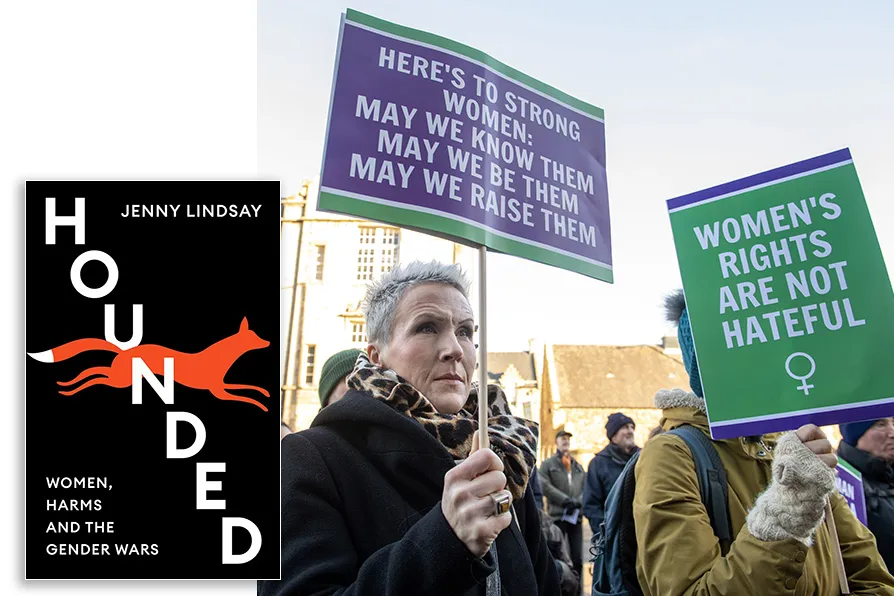DENNIS BROE searches the literary canon to explore why a duplicitous, lying, cheating, conning US businessman is accepted as Scammer-in-Chief
WILL PODMORE welcomes the case put by a feminist, disentangling the abusive rhetoric of the trans rights debate

 Supporters of the For Women Scotland and the Scottish Feminist Network demonstrate in Edinburgh, ahead of the vote on the Gender Recognition Reform (Scotland) Bill, December 21, 2022
Supporters of the For Women Scotland and the Scottish Feminist Network demonstrate in Edinburgh, ahead of the vote on the Gender Recognition Reform (Scotland) Bill, December 21, 2022
Hounded: women, harms and the gender wars
Jenny Lindsay, Polity, £14.99
Jenny Lindsay is a poet, performer and essayist based in Scotland. This splendid book examines the disputes over women’s rights in Scotland.
As she points out, many people, herself included, have been called “hateful” and “transphobic” simply for making ordinary, everyday statements about what it means to be male or female. They have been removed from social media platforms, bullied at work, lost work and jobs, and arrested, questioned and prosecuted for communications offences. This is because some gender identity ideologists see any use of sex-based language as “transphobic” in and of itself. This at once demonises those who use such language as “haters.”
As Lindsay states: “Three core beliefs are identifiable as the beliefs that are at question when a woman – feminist or not – is targeted for opprobrium in the gender wars. Core belief 1: Women are materially definable as a class of human being. Core Belief 2: Women, as adult female humans, are culturally, legislatively and politically important, with their own sets of needs, rights and concerns. Core Belief 3: Where social, cultural or legislative trends are under way – ones that may diminish women’s rights and/or liberation - then women have a right to meet and discuss freely that which affects their lives profoundly.”
Some say the whole debate is toxic, but only one side uses the rhetoric of hate. As she notes: “If we take a close look at feminist and gender critical women who become hounded, what we see are women whose main modus operandi is writing, speaking, lobbying politicians, signing petitions or, in the case of those in the creative arts, making woman-centred work about their lives. What you will not find is women who argue for violence and other harms against their opponents. What you will also not find is women who want the other side silenced.”
In 2018, the SNP administration launched an online and offline poster campaign:
“Dear Transphobes — Do you think it’s right to harass people in the street? Right to push transgender people around in clubs? Right to humiliate, intimidate and threaten them online? Well we don’t. That’s why if we see you doing harm, we’re reporting you. We believe people should be allowed to be themselves. Except if you’re spreading hate. Yours, Scotland.”
The Sturgeon administration said that transphobia “can be understood as prejudice against transgender people.” But being prejudiced is not the same as having a fear – a phobia – which again is not the same as hating. The poster campaign’s warning is also somewhat ironic, given that gender ideology activists have all too often harassed gender critical people in the street, pushed people around in clubs, and humiliated, intimidated and threatened them online.
Lindsay notes that “what women – in actuality, what all of us – are facing is an ideological movement that believes, or acts as if it believes, that feminist or gender critical women’s three core beliefs are incompatible with treating trans-identifying people with decency and kindness…”
But far from gender-critical women being haters or transphobes, they support “trans people.” As she explains: “To urge caution about the material consequences of internalising gender identity ideology, far from being a sign of ‘transphobia’, can equally be understood as being due to a deep compassion for how difficult such a life can be.”
The Supreme Court ruled on April 16 that “sex” in the 2010 Equality Act means biological sex, not “certificated” sex. The court reaffirmed the biological truths that there are two sexes, and that one cannot change sex.
Thanks to this ruling “it is now legal precedent that feminist views are protected under the category of belief: it is unlawful to discriminate against a woman on the basis of her having beliefs counter to gender identity ideology.”
This illuminating book shows why the Supreme Court’s ruling was in everybody’s interests.

Supreme Court ruling prompts sporting bodies to redefine eligibility by biological sex












